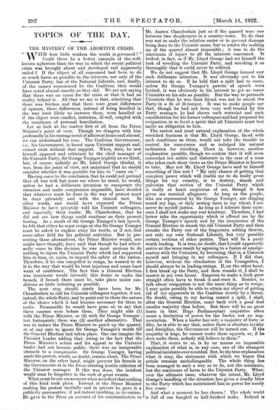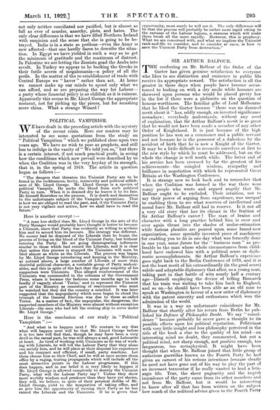TOPICS OF THE DAY.
THE MYSTERY OF THE ABORTIVE CRISIS.
" WITH how little wisdom the world is governed 1" Could there be a better example of the well- known aphorism than the way in which the recent political crisis was brought about and developed and apparently ended ? If the object of all concerned had been to do as much harm as possible to the interests, not only of the Unionist Party, but of the National liberals, and, finally, of the causes represented by the Coalition, they would have acted almost exactly as they did. We are not saying that there was no cause for the crisis or that it had no reality behind it. All that we say is that, admitting that there was friction and that there were great differences of opinion, these differences, instead of being handled in the way least likely to increase them, were handled as if the object were conflict, irritation, ill-will, coupled with the maximum of personal humiliation. Let us look at the matter first of all from the Prime Minister's point of view. Though we disagree with him profoundly in his management of affairs at home and abroad, we can understand his case. The Coalition Government, i.e., his Government, is based upon Unionist support and, cannot exist without that support. When, then, he saw himself opposed and criticized by the chief manager of the Unionist Party, Sir George Younger (rightly as we think, but, of course, unfairly as Mr. Lloyd George thinks), it was, from his point of view, not unnatural that he should consider whether it was possible for him to "carry on." Having come to the conclusion that he could not pretend that all was well but must see where he stood, he would, unless he had a deliberate intention to exasperate the situation and make compromise impossible, have decided that whatever must be done in the way of protest must be done privately and with the utmost tact. In other words, one would have expected the Prime Minister to have privately told his Unionist colleagues, and especially their leader, Mr. Chamberlain, that he did not see how things could continue on their present footing. As a result of Sir George Younger's last speech, he felt that either he must resign or else Sir George Younger must be asked to explain away his words, or if not, find some other field for his political activities. But in pre- Senting these alternatives, the Prime Minister would, one might have thought, have said that though he had reluct- antly come to this decision he was most anxious to do nothing to injure the Unionist Party which had supported him so long, or, again, to imperil the safety of the nation. Therefore, if he was compelled to resign, he wanted to do it in the way that would be least injurious and cause least want of confidence. The fact that a General Election was imminent would intensify this desire to make the breach, if breach there must be, take place under con- ditions as little irritating as possible. The next step should surely have been for Mr. Chamberlain to call his Unionist colleagues together, if not, indeed, the whole Party, and to point out to them the nature of the choice which it had become necessary for them to make. Presumably he would have gone on to say that three courses were before them. They might side (1) with the Prime Minister, or (2) with Sir George Younger ; but, fortunately, there was (3) another alternative. That was to induce the Prime Minister to patch up the quarrel, or at any rate to ignore Sir George Younger's words till the General Election had taken place. One can imagine the Unionist Leader adding that, owing to the fact that the Prime Minister's action and his appeal to the Unionist leader had not become public, .there was no insuperable obstacle to a compromise. Sir George Younger, having made his protest, would, no doubt, remain silent. The Prime Minister, on the other hand, might prevent his friends in the Government or in the Press uttering hostile criticism of the Unionist manager. If this was done, the incident would soon be forgotten in the rush of great events. What must be our amazement when we reflect that nothing of this kind took place. Instead of the Prime Minister making his protest tactfully and in private he gave it a publicity provocative, if not indeed insulting, in its nature. He gave to the Press an account of his communication to Mr. Austen Chamberlain just as if the quarrel were one between two shopkeepers in a country-town. To do that was not to make the solution easier or to prevent damage being done to the Unionist cause, but to render the making up of the quarrel almost impossible ; it was to do the maximum of injury to all the interests concerned. It looked, in fact, as if Mr. Lloyd George had set himself the task of wrecking the Unionist Party, and wrecking it so thoroughly that it could never be refitted. We do not suggest that Mr. Lloyd George formed any such deliberate intention. It was obviously not to his interest to do so. If he held that a split had to come, unless Sir George Younger's powers of speech were limited, it was obviously to his interest to get as many Unionists on his side as possible. But the way to persuade Unionists that he was their friend was not to smash the Party in a fit of ill-temper. It was to make people say that, though he had not been very well treated by the Party manager, he had shown such restraint and such consideration for his former colleagues and had proposed his resignation in so loyal a spirit that all Unionists must feel under an obligation to him. The easiest and most natural explanation of the whole wretched business is that Mr. Lloyd George, faced with such conditions as these; would not take the trouble to control his annoyance and so indulged his natural inclination for wrecking. There is, however, another explanation possible, though we confess that it will seem somewhat too subtle and elaborate in the case of a man who takes such short views as the Prime Minister is known to take. May not Mr. Lloyd George have said to himself something of this sort ? "My only chance of getting that complete power which will enable me to do really great things for my country, is to destroy, smash and pulverize that section of the Unionist Party which is really at heart suspicious of me, though it has given me nominal allegiance. As long as the people, who are represented by Sir George Younger, are clinging round my legs, or slyly sowing area in my wheat, I can never do myself justice. As long as I tolerate their exist- ence I shall not make any real headway. Therefore, I had better take the opportunity which is offered me by Sir George Younger's speech and by the imminence of the General Election to smash the old Unionist Party and then remake the Party out of the fragments, adding thereto, not only my own National Liberals, but very possibly certain sections of other parties. That will be a party worth leading. It is true, no doubt, that I could apparently arrive at the same result by agreeing to a fusion or amalga- mation with the Unionists, by becoming, that is, a Unionist myself and bringing in my colleagues. If I did that, however, without the elimination of the Youngerites, I should always be in leading-strings. If, on the other hand, I first break up the Party, and then remake it, I shall be master in my own house. Surgeons to make a limb grow straight often have to break it and reset it. Besides, to talk about resignation is not the same thing as to resign. I may quite possibly be able to attain my object of getting rid of my opponents in the Coalition merely by a threat. No doubt, owing to my having caused a split, I shall, after the General Election, come back with a good deal smaller majority than before. But there will be no great harm in that. Huge Parliamentary majorities often mean a limitation of power for the leader, not an aug- mentation. When a leader has only a majority of forty or fifty, he is able to say that, unless there is absolute loyalty and discipline, the Government will be turned out. If the majority is huge, he cannot make these appeals, or, if he does make them, nobody will believe in them."
That, it seems to us, is by no means an impossible explanation of what is, in any case, one of the strangest political incidents ever recorded. But, be the true explanation what it may, the statement with which we began this article remains unchallengeable. The whole thing has been managed in such a way as to do, not the minimum, but the maximum of harm to the Unionist Party. What- ever the ultimate issue, whatever the intent, Mr. Lloyd George's handling of the situation has given a deadly blow to the Party which has maintained him in power for nearly five years. And *hat a moment he has chosen The whole world is full of our bungled or -half-finished tasks. Ireland is not only neither conciliated nor pacified, but is almost as full as ever of murder, anarchy, plots, and hates. The only clear difference is that we have filled Northern Ireland with suspicion and the sense that she is going to be be- trayed. India is in a state so perilous—even the Army is now affected—that one hardly dares to describe the situa- tion. In Egypt we have yielded in such a way as to get the minimum of gratitude and the maximum of distrust. In Palestine we are letting the Zionists goad the Arabs into revolt. In Turkey we appear to be backing the Greeks in their futile access of megalomania—a policy of all the perils. In the matter of the re-establishment of trade with Central Europe we " haver " rather than act. At home we cannot make up our minds to spend only what we can afford, and so are preparing the way for Labour— a party whose financial policy is as childish as it is ruinous. Apparently this seems to Mr. Lloyd George the appropriate moment, not for picking up the pieces, but for smashing more china. What a strange Wizard I



































 Previous page
Previous page